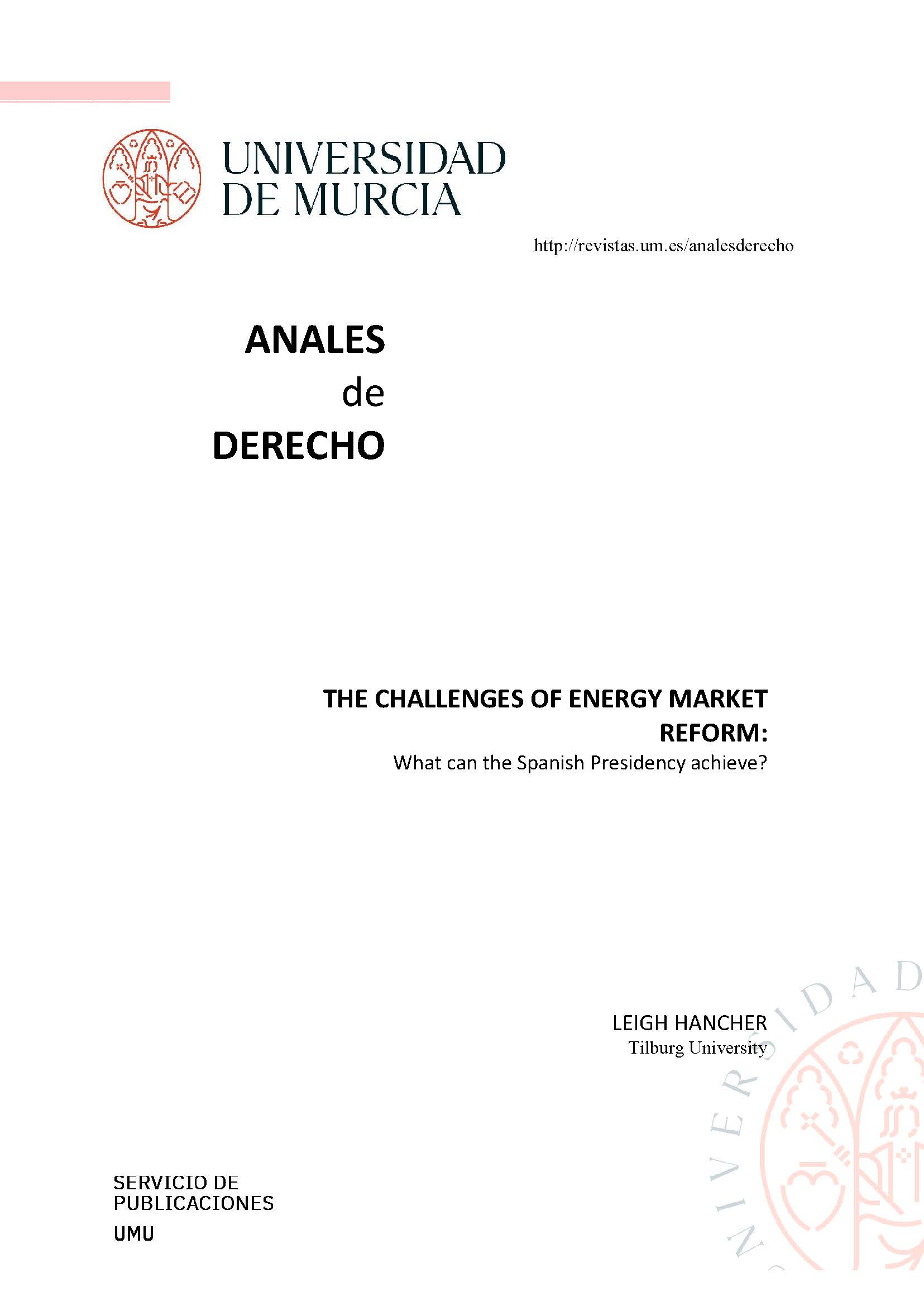The Challenges of energy market reform
what can the Spanish Presidency achieve?
Abstract
The contribution examines the achievement of the three core objectives of European energy policy in the aftermath of the energy crisis of 2022. Energy security, sustainability and competitiveness have been at the root of European energy policy for many decades but progress in achieving them has been mixed. Member states can rely on their rights to choose their own energy mix. The European Union’s initial response to the energy crisis was to invoke a little used Article 122(1) of the Treaty on the Functioning of the European Union (TFEU) to adopt a series of rapidly enacted emergency legislation to promote solidarity between the 27 member states.
This article questions whether that response has led to an increased centralization of powers for the EU institutions at the expense of national governments? Can the EU institutions now set the policy agenda for the energy transition more efficiently? Are the EU state aid rules likely to be implemented more strictly to ensure a transition away from fossil fuels before 2050 or do national governments remain firmly in the driving seat? In the alternative, are there any emergent trends from the management of the crisis that are likely to be perpetuated in the longer term as Europe seeks to transition as rapidly as possible to a net zero carbon economy?
Downloads
-
Abstract217
-
.pdf188
References
ACER, ‘Wholesale Market Monitoring Report’, March 2023. https://www.acer.europa.eu/electricity/market-monitoring-report
BATTLE, C. et al., “The EU Commission’s proposal for improving the electricity market design: Treading water, but not drowning”, MIT-CEER Commentary, RC-2023-03;
Commission, Communication on REPowerEU: Joint European Action for more affordable, secure and sustainable energy, COM(2022) 108 final, (8.3.2022), with Annexes; and Communication on Options and COM/2022/230 final.
Commission, Report from the Commission to the European Parliament and the Council on the review of emergency interventions to address high energy prices in accordance with Council Regulation (EU) 2022/1854, COM(2023)302 final, 5.6.2023.
Council, Regulation (EU) 2022/1032 of the European Parliament and of the Council of 29 June 2022 amending Regulations (EU) 2017/1938 and (EC) No 715/2009 with regard to gas storage, OJ L 173, 30.6.2022, p. 17–33.
Council, Council Regulation (EU) 2022/1369 of 5 August 2022 on coordinated demand- reduction measures for gas, OJ L 206, 8.8.2022, p. 1–10. Council Regulation No. 2022/1854 on an Emergency Intervention to address high energy prices in the EU , OJ L 261, 07.10.2022, p. 1.
Council, Regulation 2022/2576 enhancing solidarity through better coordination of gas purchases, reliable price benchmarks and exchanges of gas across borders, OJ L 335/1, 29.12.2022, p. 1.
Council, Regulation 2022/2577 laying down a framework to accelerate the deployment of renewable energy, OJ L 335, 29.12.2022, p. 36. Council Regulation (EU) 2022/2578 of 22 December 2022 establishing a market correction mechanism to protect Union citizens and the economy against excessively high prices, OJ L 335, 29.12.2022, p. 45–60.
HANCHER, L., DE HAUTECLOCQUE, A., HUHTA,K., and SADOWSKA, M, Capacity Mechanisms in the EU Energy Markets,Law, Policy, and Economics,Second Edition, OUP, 2022
HANCHER et al, State Aid and the ‘Energy Sector, Bloomsbury Publishing, 2018.
IEA,’Renewables Report’ Paris, 2022. IEA (2022), Renewables 2022, IEA, Paris https://www.iea.org/reports/renewables-2022, License: CC BY 4.0
Jones, D., ‘European Electricity Review 2023. https://ember-climate.org/insights/research/european- electricity-review-2023.
HARALDSDÓTTIR, K., The limits of EU competence to regulate conditions for exploitation of energy resources: Analysis of Article 194 (2) TFEU, European Energy and Environmental Law Review 23 (6).
HUHTA, K, ‘The Scope of State Sovereignty under Article 194(2) TFEU and the Evolution of EU Competences in the Energy Sector’ (2021) 70(4) ICLQ 991;
MEEUS, L., “Electricity market reform: what is (not) in the European Commission proposal”, FSR Policy Brief, 2023/07, May 2023.
MCWILLIAMS, B., TAGLIAPIETRA, S., ZACHMANN,G, AND DESCHUYTENEER, T., (2023) ‘Preparing for the next winter: Europe’s gas outlook for 2023’, Policy Contribution 01/2023, Bruegel
RIEMER, M.; SCHREINER, F.; WACHSMUTH., J., Conversion of LNG Terminals for Liquid Hydrogen or Ammonia. Analysis of Technical Feasibility und Economic Considerations.
KARLSRUHE: Fraunhofer Institute for Systems and Innovation Research ISI, 2022:
SESINI, M ., et al: ‘Solidarity measures: Assessment of strategic gas storage on EU regional risk groups natural gas supply resilience’ , Applied Energy , (2002) 308(1-2):118356.


This work is licensed under a Creative Commons Attribution-NonCommercial-NoDerivatives 4.0 International License.
The journal is object of publication in electronic and printed form. With the object of the first one, the author is supposed aware, being presumed that he lends his consent to such form of publication by the circumstance of presenting his manuscript. At the time of the printed edition the author will receive, of free form, 25 offprints of his contribution.
